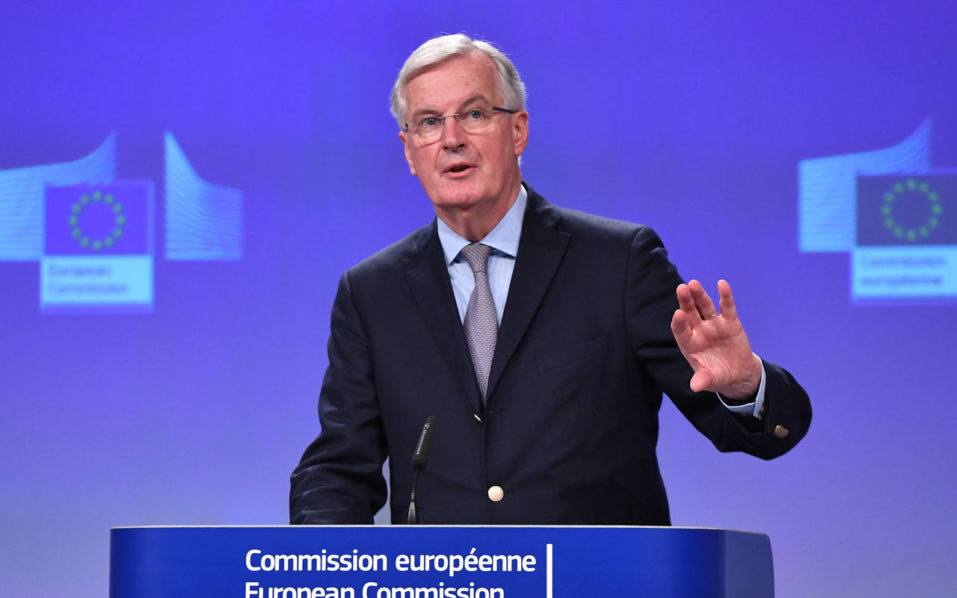
The EU’s chief Brexit negotiator Michel Barnier said Britain would have to remain part of the bloc’s single market and pay into its budget during that period, despite losing all its voting rights.
British Prime Minister Theresa May had indicated that she wanted a longer transition time of about two years after Britain formally leaves the EU on March 29, 2019 — three months longer than the proposed EU deadline.
The development comes after EU leaders signed off last week on the first stage of Brexit negotiations, ending more than a year of stalemate over Britain’s bill for leaving the bloc, as well as the fate of the Irish border and EU expatriates.
“From our point of view the logical end should be December 21, 2020,” Barnier said at a press conference in Brussels as he presented the new Brexit negotiating guidelines produced by the commission, the EU’s executive arm.
Barnier said this would coincide with the end of the EU’s seven-year budget for 2014 to 2020, and would avoid potentially thorny negotiations on how much Britain should pay for the extra few months in 2021 that would be necessary under May’s proposal.
‘Complications’ ahead
Talks on the post-Brexit transition period are to start in January, while negotiations on the future relationship between Britain and the EU, including steps towards an eventual trade deal, are due to begin in March.
“The transition period is useful and will enable Britain to get prepared for the kind of challenges that they will have to face, and to prepare also for the complications of the new relationship,” Barnier said.
But as May presses for the transition deal, she faces opposition from hardline eurosceptics in her Conservative Party over the EU’s tough terms.
Barnier reiterated that during the transition period Britain would remain part of the bloc’s single market, which authorises freedom of immigration for EU nationals, one of the key concerns of the pro-Brexit lobby in Britain.
The rules of the single market were “indivisible” and there could be no “cherry-picking” by Britain during the transition, Barnier said.
Britain would also be subject to the European Court of Justice and even be required to follow new EU rules adopted during that period, Barnier added.
Brexit law hurdle
May already faces difficulties getting Brexit through parliament, after suffering a humiliating defeat last week by pro-European members of her own Conservative party, who voted to ensure parliament has the final say on any divorce deal with Brussels.
She looks set to avoid a second parliamentary rebellion over plans to enshrine Brexit day in law, by agreeing to another amendment giving some flexibility to move the date — March 29, 2019 — if negotiations with the EU go down to the wire.
Draft legislation intended to smooth the process moved a step closer to becoming law on Wednesday as MPs held the final day of detailed scrutiny of a bill that transfers EU rules into British law.
May has already accepted in theory that the ECJ will continue to have jurisdiction and that London will have no legal basis to conclude its own trade deals during the period.
Influential pro-Brexit lawmaker Jacob Rees-Mogg criticised these conditions as “rather hostile”, leaving the UK “no more than a vassal state, a colony, a serf of the European Union”.
May insisted to British lawmakers on Monday that the transition was necessary because it would provide continuity for businesses and individuals until the future relationship is resolved.
She repeated that Britain would be leaving the EU’s single market and customs union, but said the transition arrangements were “a practical matter that most people will understand and appreciate”.
May’s promises to leave the EU’s common agriculture and fisheries policies — key red lines for Brexiteers — appeared to be on track Wednesday after comments from Barnier.
He said that while Britain would officially be excluded from meetings on fishing quotas involving its large fishing fleet, the two sides would come up with “specific procedural arrangements” so its voice would be heard.
[ad unit=2]



